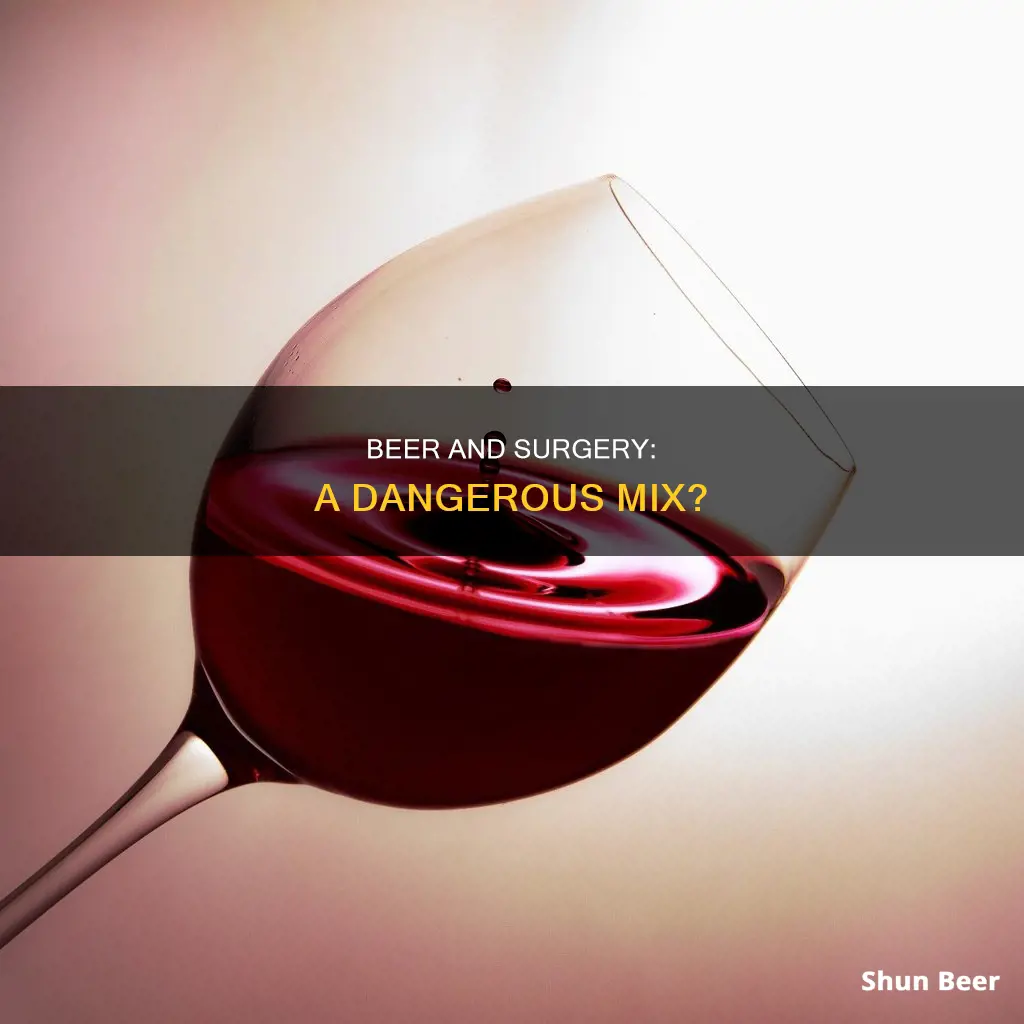
Drinking beer or any alcoholic beverage before surgery is highly discouraged as it can lead to severe complications during and after the procedure. Alcohol can thin the blood and cause excessive bleeding during surgery, which can be life-threatening. It can also interfere with anaesthesia, delay recovery, and cause negative interactions with medication. To minimise risks, it is recommended to stop drinking alcohol at least 48 hours before surgery, and ideally for several weeks.
What You'll Learn

Alcohol negatively affects the liver, pancreas, heart, and immune system
The Liver
The liver is one of the organs most commonly damaged by alcohol. The liver metabolises alcohol through the enzymes alcohol dehydrogenase and cytochrome P450 2E1, which results in the production of the toxic metabolite acetaldehyde. Acetaldehyde has damaging effects on the liver, including altering liver proteins and inducing a damaging immune response. Alcohol also increases the production of digestive enzymes in the pancreas, which can lead to the premature activation of digestive enzymes and subsequent self-digestion. This can result in inflammation of the pancreas (pancreatitis) and, in some cases, can be fatal.
The Pancreas
The pancreas is another organ that is frequently damaged by alcohol. Alcohol can cause acute and chronic pancreatitis, a potentially fatal inflammation of the pancreas. Alcohol can lead to the blockage of small pancreatic ducts and the destruction of pancreatic tissue by digestive enzymes. Additionally, alcohol metabolism within the pancreas may damage cell membranes. Alcohol consumption increases the risk of postoperative bleeding and infection, which can lead to sepsis, a potentially life-threatening condition.
The Heart
Alcohol consumption can cause cardiac complications, especially if you already have heart problems. It can lead to high blood pressure, low blood pressure, irregular heart rate, and weakened heart muscles. These conditions can complicate the recovery process after surgery.
The Immune System
Alcohol weakens the immune system, increasing the risk of infection. This can lead to a poor immune response to infection, which, in turn, can result in sepsis and septic shock, a life-threatening condition.
In summary, alcohol consumption can have detrimental effects on the liver, pancreas, heart, and immune system. These negative impacts can increase the risk of complications during and after surgery, prolong recovery time, and, in some cases, jeopardise your life.
Beer and Methotrexate: Safe Mix for Ocular Lymphoma Treatment?
You may want to see also

It can cause problems with anesthesia.
Drinking beer or any alcoholic beverage before surgery can cause problems with anesthesia. Alcohol can affect the body's systems that are also affected by anesthesia, such as breathing, heart rate, and blood circulation. This can overload the liver, which may not be able to metabolize multiple substances at once. Both anesthesia and alcohol can cause nausea and vomiting, increasing the risk of aspiration (inhaling vomit), which can be fatal.
The anesthesiologist may need to adjust the dosage if there is alcohol in the patient's system, which can be dangerous. A higher dose of anesthesia can increase the risk of cardiac events, especially for those with pre-existing heart problems. Alcohol also thins the blood, which can lead to uncontrolled bleeding during surgery. This effect is amplified if the patient is taking blood-thinning medications or has a clotting disorder.
In addition, alcohol can interfere with the absorption of anesthesia, potentially rendering some sedatives ineffective. This can lead to the administration of additional doses of anesthesia, which can be extremely dangerous. Alcohol consumption before surgery can also increase the risk of other serious complications of anesthesia, such as accidental awareness (waking up during surgery) and anaphylaxis (severe allergic reaction). In some cases, these complications can be fatal.
Therefore, it is crucial to abstain from alcohol for at least 48 hours before surgery to minimize the risk of complications and ensure the safety and effectiveness of the anesthesia.
Beer and Pancreatitis: What You Need to Know
You may want to see also

It can lead to interference with medication
Drinking beer or any alcoholic beverage before surgery is extremely risky and can lead to severe complications during and after the procedure. It is best to avoid alcohol for at least 48 hours before surgery, and ideally, one should abstain from alcohol for a more extended period, ranging from two to several weeks.
Alcohol can lead to interference with medication, causing adverse reactions or reducing the effectiveness of drugs administered before, during, and after surgery. This includes pain medications, sedatives, antibiotics, and other drugs. Mixing alcohol with painkillers can be dangerous, increasing the risk of damaging wounds and overexertion. Alcohol also interacts with opioids, which are often prescribed post-surgery, and this combination can lead to severe complications and even death.
The impact of alcohol on the body's ability to absorb and metabolise medication is a significant concern. Alcohol affects the liver's functioning, which is crucial for processing medications. If the liver is overloaded or impaired due to alcohol consumption, it may not be able to effectively metabolise multiple substances, leading to unpredictable and potentially harmful interactions.
Additionally, alcohol can affect the body's natural "stress" response to surgery, increasing the risk of complications and worsening existing health problems. It can also cause inflammation and swelling, which can interfere with the healing process, particularly in cosmetic surgery, where it may affect results.
In conclusion, drinking beer or any alcoholic beverage before surgery is strongly discouraged due to the serious risks associated with medication interference, impaired liver function, increased stress response, and potential negative impacts on surgical outcomes and recovery. Patients should be honest about their alcohol consumption and seek guidance from their healthcare team to ensure a safe and optimal surgical experience.
Beer and Fun: Chuck E. Cheese, Atlanta Style!
You may want to see also

It increases the risk of infection
Drinking beer or any alcoholic beverage before surgery is extremely risky and can lead to severe complications during the procedure and recovery. It is best to avoid alcohol for at least 48 hours before a scheduled surgery, and even better if one can stop a week or two earlier.
Here's why drinking beer before surgery increases the risk of infection:
Weakened Immune System
Alcohol consumption weakens the immune system, making it harder for the body to fight off infections. This increases the chances of developing an infection at the surgical site, in the respiratory system, or in the urinary tract. A weakened immune system can also lead to sepsis, a potentially life-threatening condition where the body's response to infection is impaired.
Interference with Medications
Alcohol can interact with medications given before, during, and after surgery, such as painkillers, sedatives, or antibiotics. This interference can reduce the effectiveness of these medications or cause adverse reactions, impairing the body's ability to heal and increasing the risk of infection.
Delayed Wound Healing
Alcohol thins the blood, interfering with the body's ability to clot and stop bleeding. This can lead to uncontrolled bleeding during surgery and delayed healing of surgical wounds, providing a longer window for potential infections to develop.
Increased Risk of Complications
Alcohol consumption can lead to various complications during surgery, including problems with anesthesia, increased bleeding, and interference with other medications. These complications can prolong the surgery, require additional interventions, and increase the risk of infection.
Heart and Lung Complications
Chronic alcohol use or even a single episode of binge drinking can affect the heart and lungs, leading to dehydration, high or low blood pressure, irregular heart rate, and weakened heart muscles. These complications can further compromise the body's ability to fight infections and increase the risk of post-surgical infections.
In summary, drinking beer before surgery is not advisable due to the increased risk of infection and other serious complications. It is crucial to disclose any recent alcohol consumption to the surgical team and follow their instructions on abstaining from alcohol to ensure a safe and successful surgical outcome.
Microneedling: Drinking Beer, What You Need to Know
You may want to see also

It can cause dehydration
Drinking beer or any alcoholic beverage before surgery is not recommended due to the risks of surgical complications and adverse effects on recovery. One of the critical reasons for this is that alcohol can cause dehydration, which can have several implications for the surgical process and postoperative healing.
Dehydration caused by alcohol consumption can lead to a range of issues during surgery and recovery. Firstly, dehydration affects the skin, causing it to become less supple and more prone to cracking. This is particularly concerning during cosmetic surgery procedures, as dehydrated skin may result in unattractive scarring and a less desirable outcome. For example, in rhinoplasty, alcohol-related dehydration and swelling can lead to a more painful recovery and potentially impact the final results.
Secondly, dehydration can impact the body's ability to heal wounds effectively. Dehydration slows down the healing process and increases the risk of prolonged bleeding and infections. This can result in delayed recovery and may even require a longer hospital stay.
Additionally, alcohol consumption can cause dehydration, which can interfere with the body's natural "stress" response to surgery. This can worsen existing health problems and increase the likelihood of postoperative complications.
To ensure optimal surgical outcomes and a smooth recovery process, it is generally recommended to abstain from alcohol consumption for at least 48 hours before surgery. In some cases, reducing alcohol intake several weeks in advance may be beneficial, especially for individuals with alcohol dependence or those undergoing specific types of surgery.
Beer and Pregnancy: What You Need to Know
You may want to see also
Frequently asked questions
Drinking alcohol before surgery can lead to severe complications during and after the procedure. Alcohol can thin the blood, increasing the risk of uncontrolled bleeding during surgery and prolonged recovery time. It can also affect how your body absorbs anaesthesia, potentially leading to an overdose. It is best to avoid alcohol for at least 48 hours before surgery.
Alcohol can remain in your system and affect your health for up to 24 hours after drinking. Even a single drink the day before surgery can be dangerous and cause complications. It is best to abstain from alcohol for at least 48 hours before your procedure.
Drinking alcohol immediately after surgery can be dangerous as it can impact your immune system and slow down the healing process. Alcohol also thins the blood, increasing the risk of prolonged bleeding and infections. It is generally recommended to avoid alcohol for at least two weeks after surgery, or until you have finished taking any prescribed medication.







